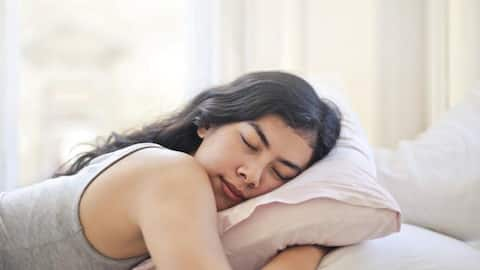World Sleep Day: Study reveals poor sleep habits among Indians
What's the story
On World Sleep Day, a new report reveals sleeping patterns among Indians. The 7th Great Indian Sleep Scorecard (GISS) 2024, conducted by sleep and home solutions provider Wakefit, shows that a concerning 58% of Indians hit the sack after 11 pm, with nearly half waking up feeling exhausted. A quarter of Indians think they suffer from insomnia, and a whopping 88% experience multiple awakenings throughout the night.
Reasons
Digital exposure and stress levels contribute to sleep problems
The GISS study indicates that digital exposure and stress are key contributors to India's sleep issues. Social media and OTT platforms are responsible for 54% of Indians staying up beyond their ideal bedtime. A staggering 88% of individuals use their phones right before sleeping, and over 30% lie awake worrying about their future. Chaitanya Ramalingegowda, Director and Co-founder of Wakefit stressed the importance of addressing sleep deprivation symptoms and redefining our relationship with technology, work, and well-being.
Habits
Sleep habits in urban India
The GISS study examines urban India's sleep habits. Half of Gurugram's population and approximately 46% of individuals in Mumbai, Delhi, and Kolkata stay up beyond their ideal bedtime. In Gurugram, 61% of people wake up feeling drained. Social media keeps 43% of Hyderabad, Chennai, and Bengaluru residents awake, while work-related stress leads to late nights for 33% of people in Chennai, Gurugram, and Hyderabad. The report also sheds light on gender and age-related sleep patterns.
Women stats
Women experience higher morning tiredness
In 2024, women were found to be sleeping well past their ideal bedtime 9% more than men, resulting in a 20% higher rate of morning fatigue among them. Women also wake up over three times a night -50% more frequently than men and are 20% more likely to stay awake worrying about the future. These findings demonstrate the intricate sleep experiences of women while also suggesting the broader impact of lifestyle, stress, and societal roles on their sleep health.
Gen X
Age-related sleep patterns and solutions
The GISS report disclosed that 48% of individuals aged 18 to 30 went to bed after 11 pm. Gen X is not immune to late-night screen time, with 42% confessing to doom scrolling into the early hours. Sleep challenge solutions differ by age, with 37% of 18-30 year-olds believing that avoiding digital devices before sleep will improve sleep quality, while 33% of those over 45 prefer the comfort of a better mattress.
